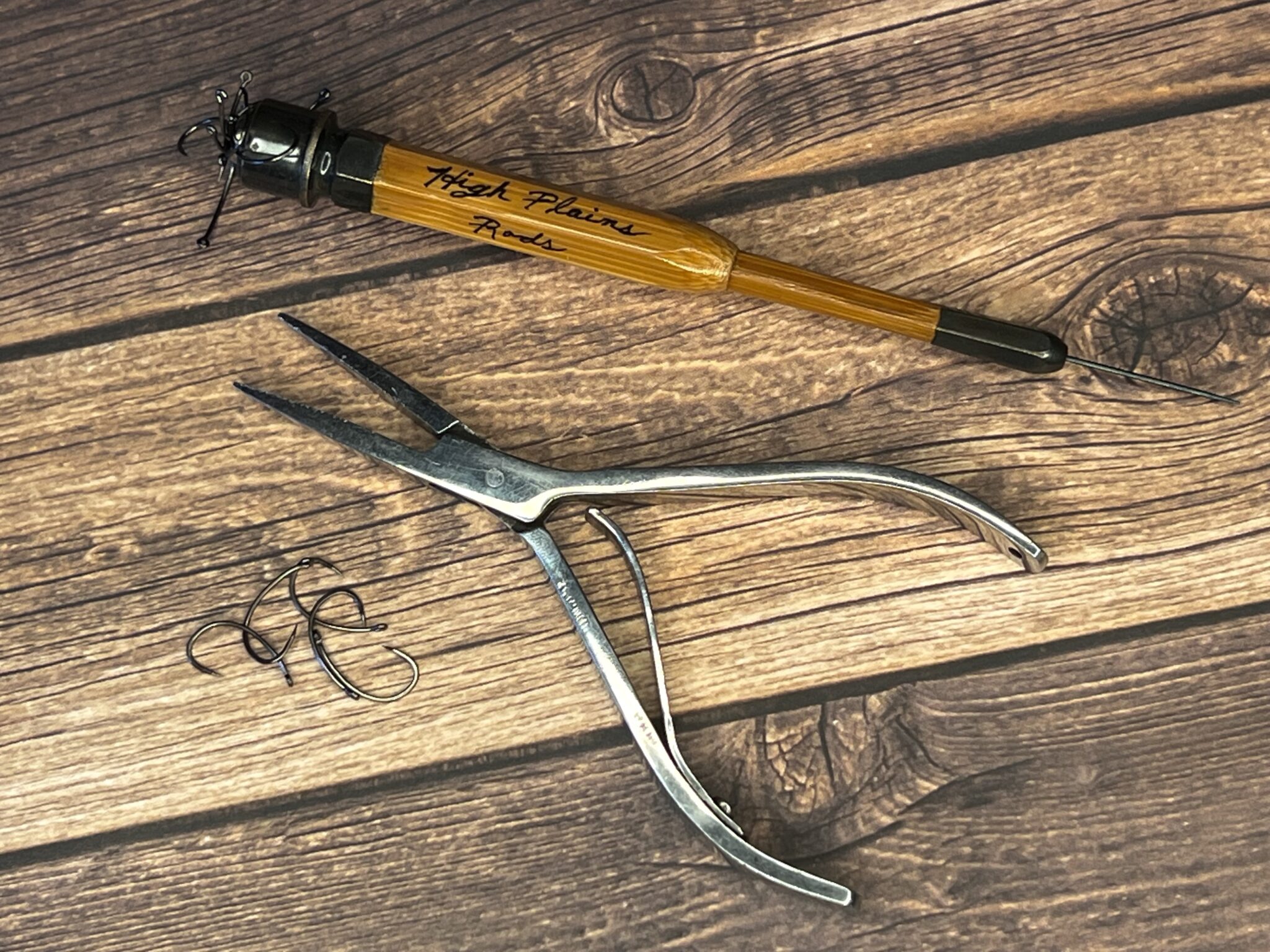
For over 20 years, I’ve been fishing exclusively with barbless flies. And not just for trout–for bass, panfish, steelhead, salmon, and even saltwater fish. In fact, even before I started fly fishing, I used to crimp down the barbs on my spoons, spinners, and crankbaits too. Why? Three simple reasons…
1. Better Hooksets
A barb creates resistance that makes it harder for the hook point to penetrate. That increases the likelihood of getting a bad hookset and losing fish. Go take a piece of paper and try to hook it with both a barbed and barbless hook and you’ll see what I mean. I’ve seen hooks that had barbs twice the diameter of the hook wire. That’s a recipe for a lost fish! It’s much easier to penetrate the fish’s mouth all the way to the bend if the hook is more like a smooth needle than a barbed harpoon.
2. Less Injury to fish
I would guess that most people who fish barbless flies cite this as their main motivation. A barbless hook causes less damage to the fish (especially if foul hooked). And since it’s a lot easier to remove than a barbed hook, you can get the fish back to the water faster, further reducing the trauma.
3. Less Injury to YOU!
If you ever accidentally hook yourself, you will be glad you had a barbless fly on (trust me on this one). Just as they’re easier to remove from fish, they’re also easier and less painful to remove from a human hand, leg, or ear if the wind has it in for you. But if you decide to ignore this post and continue to fish with barbed flies, at least read this tutorial on how to safely remove them from your flesh when you inevitably hook yourself.
But don’t you lose more fish with barbless flies?
Nope. And if you don’t believe me, I’ve got 20 years of evidence to prove it. This myth is a carryover from the world of conventional fishing (where you actually can lose fish on barbless lures). The reason is that lures are much heavier than flies and give the fish leverage to shake the hook out. I have lost bass that jumped out of the water and with a couple of head shakes, threw my spinnerbait like they were pitching for a major league team.
But with flies that weigh next to nothing (like trout flies), the fish don’t have this leverage. Of course, they potentially could with heavily weighted flies like Clouser Minnows, but in my experience, as long as you keep tension on the line, you won’t lose fish. I’ve landed plenty of bluefish, stripers, jacks, bonefish, tarpon and snook on barbless flies with weighted eyes. And to the astonishment of my guides, I still crimp down the barbs on my Crazy Charlies, Clouser Minnows, and Deceivers every time I go saltwater fishing. Haven’t lost a fish because of it yet.
As even further evidence, all of the flies I sell in my Etsy Shop are barbless and I’ve never had one customer complain about lost fish.
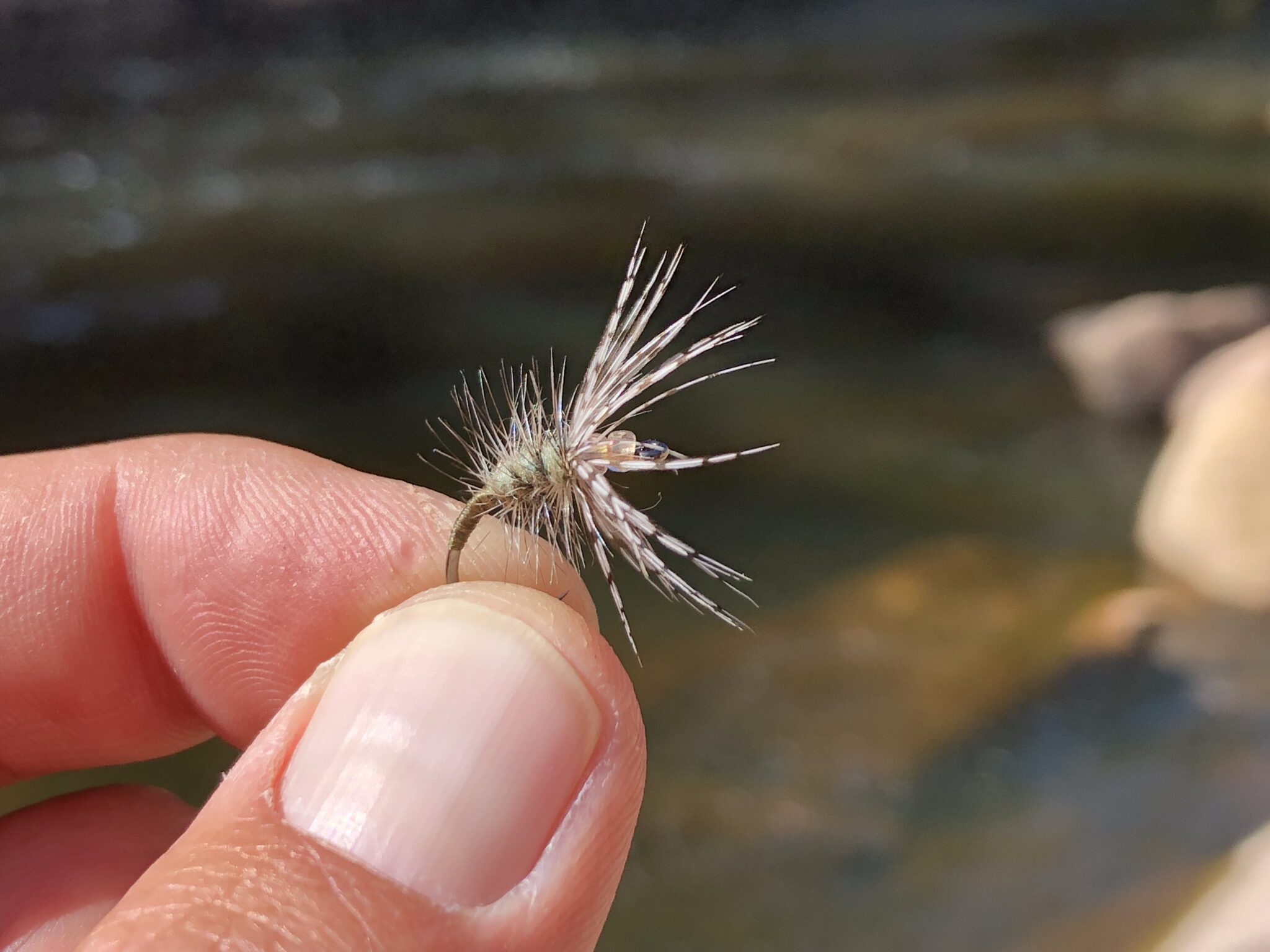
Get in the habit!
No fly ever leaves my vise before the barb is crimped down (unless the hooks were barbless to begin with). I have a small pair of spring-loaded pliers (see above) I use but you could also just use your hemostats. If I’m “assembly-line tying”, I lay out all the bare hooks and crimp their barbs before I put them in the vise. If you don’t tie, try to get in the habit of crimping down all the barbs on the flies you buy right after you get home from the fly shop. That way, you won’t forget and won’t have to do it on the stream.
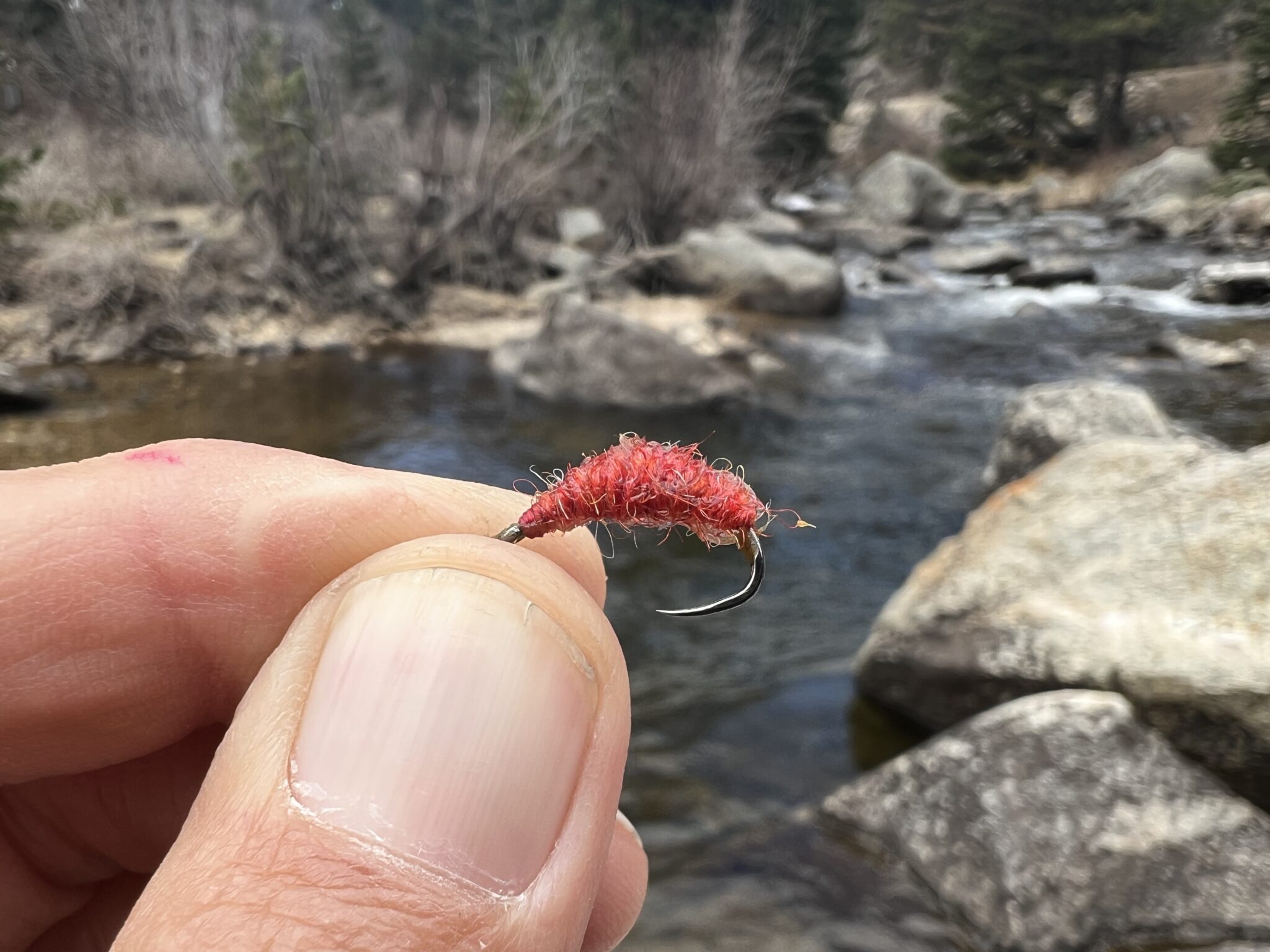
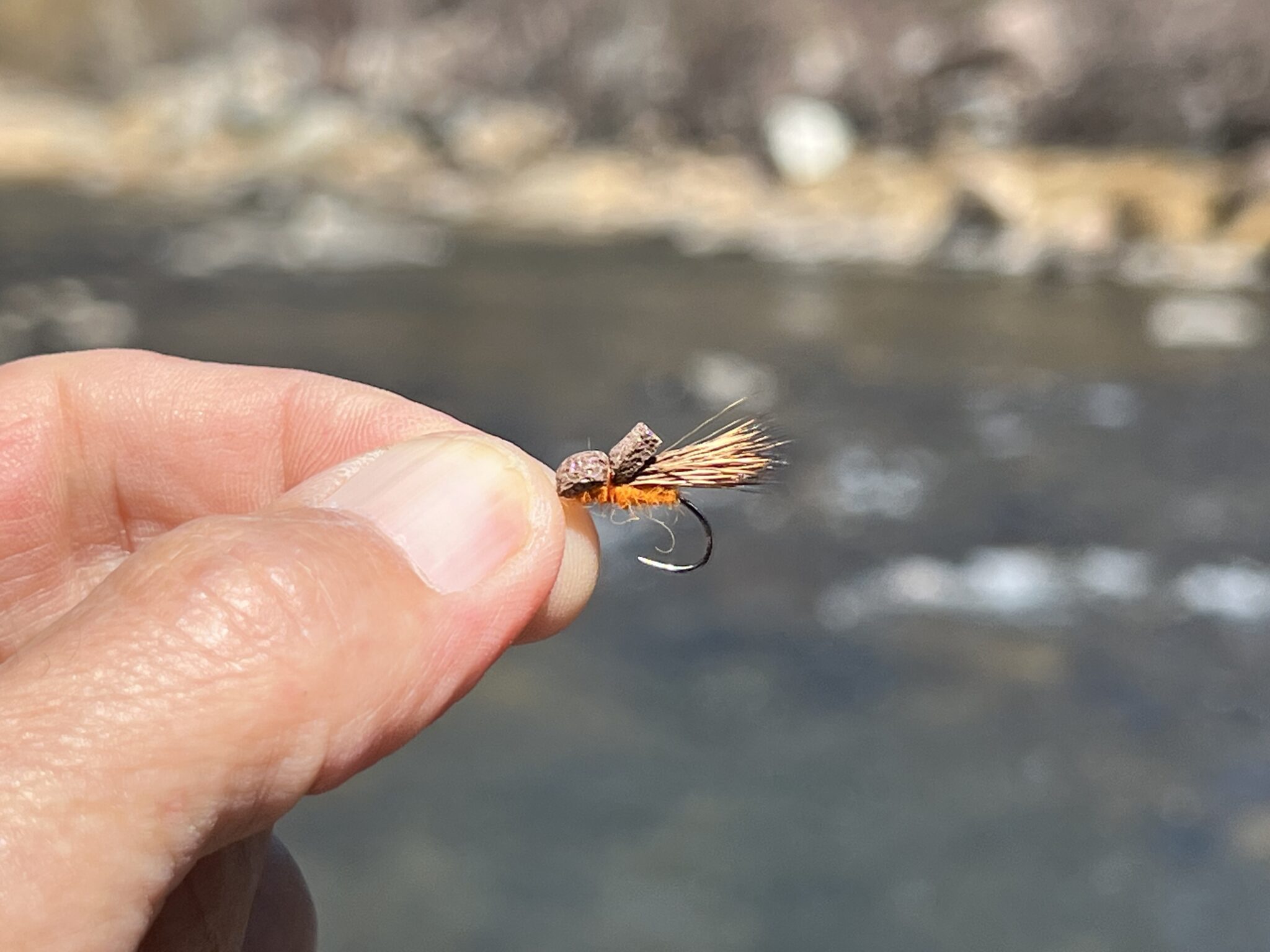
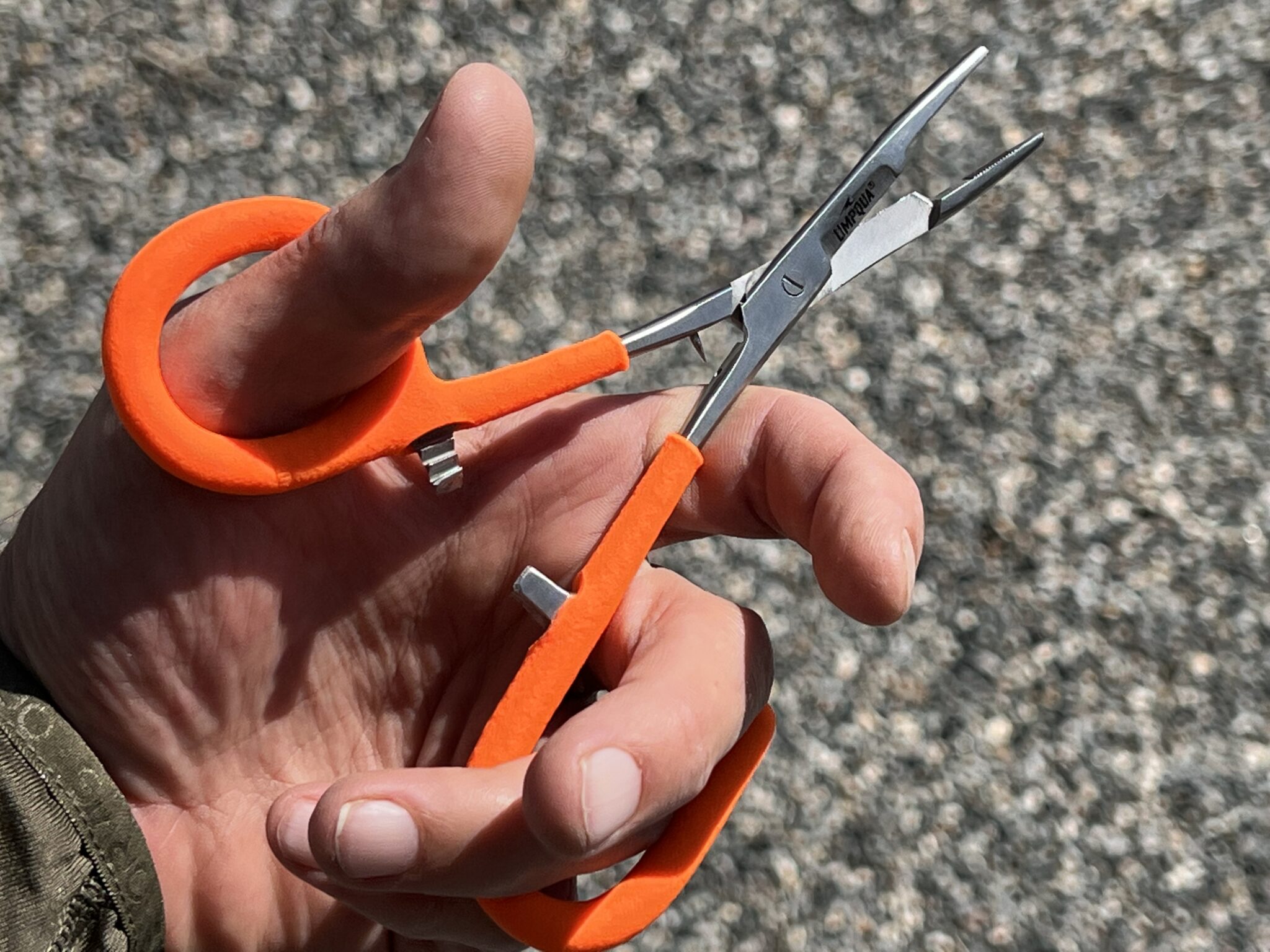
Warning!
When de-barbing a hook, make sure you completely smash the barb down flat so it’s flush with the hook point. It should be smooth like a needle, and not have an open hook like this:
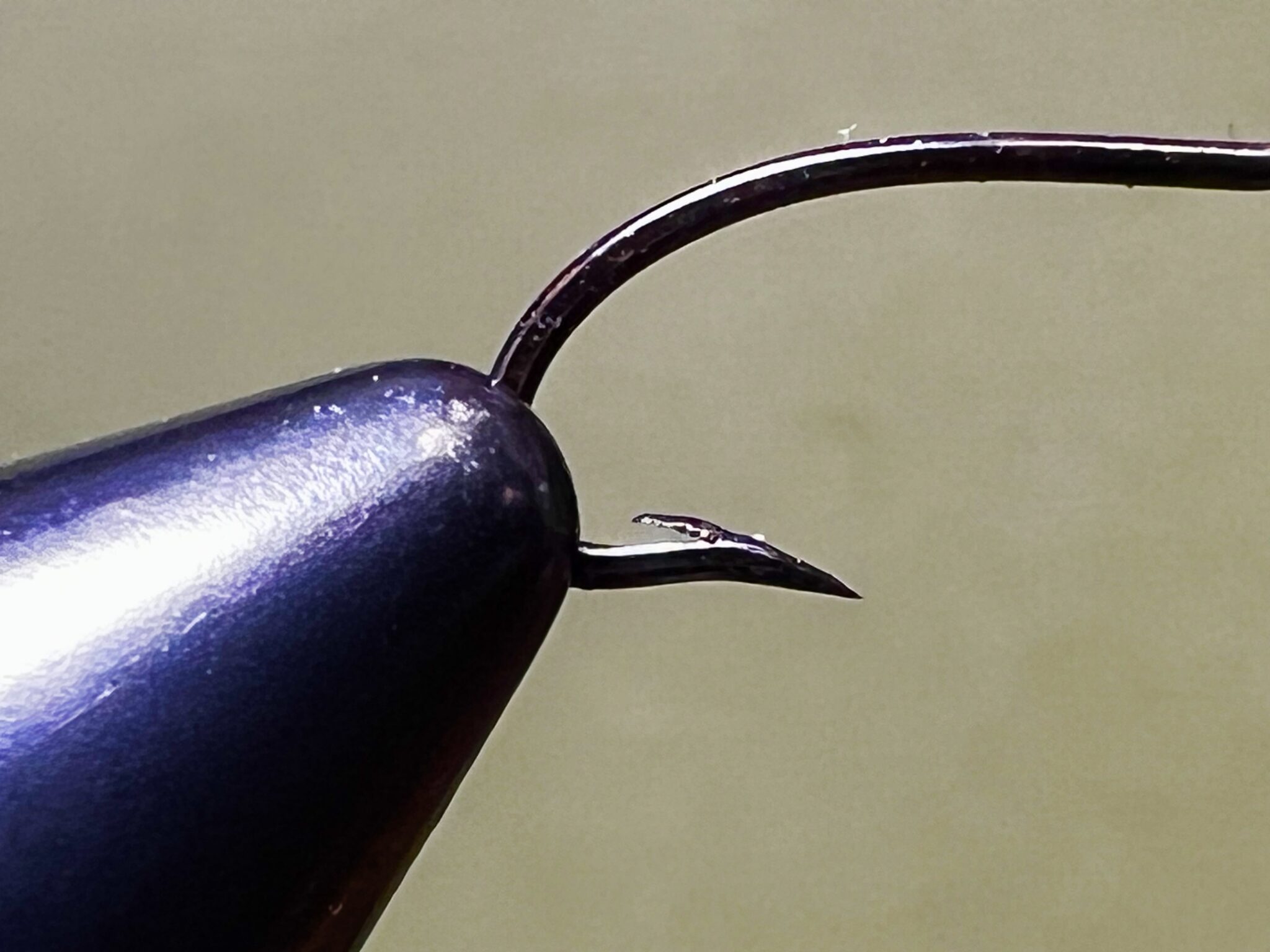
That’s actually worse than if you left the barb as it was were. That deep hook catches flesh or cartilage at such a steep angle, it’s almost impossible to get out without making an incision. And it certainly won’t end up well for the fish.
This typically happens when flimsy hemostats are used. If you’re crimping barbs onstream, sturdier hemos like my Umpqua River Grip clamps are strong enough to flatten the barb completely down–even on smaller saltwater hooks!
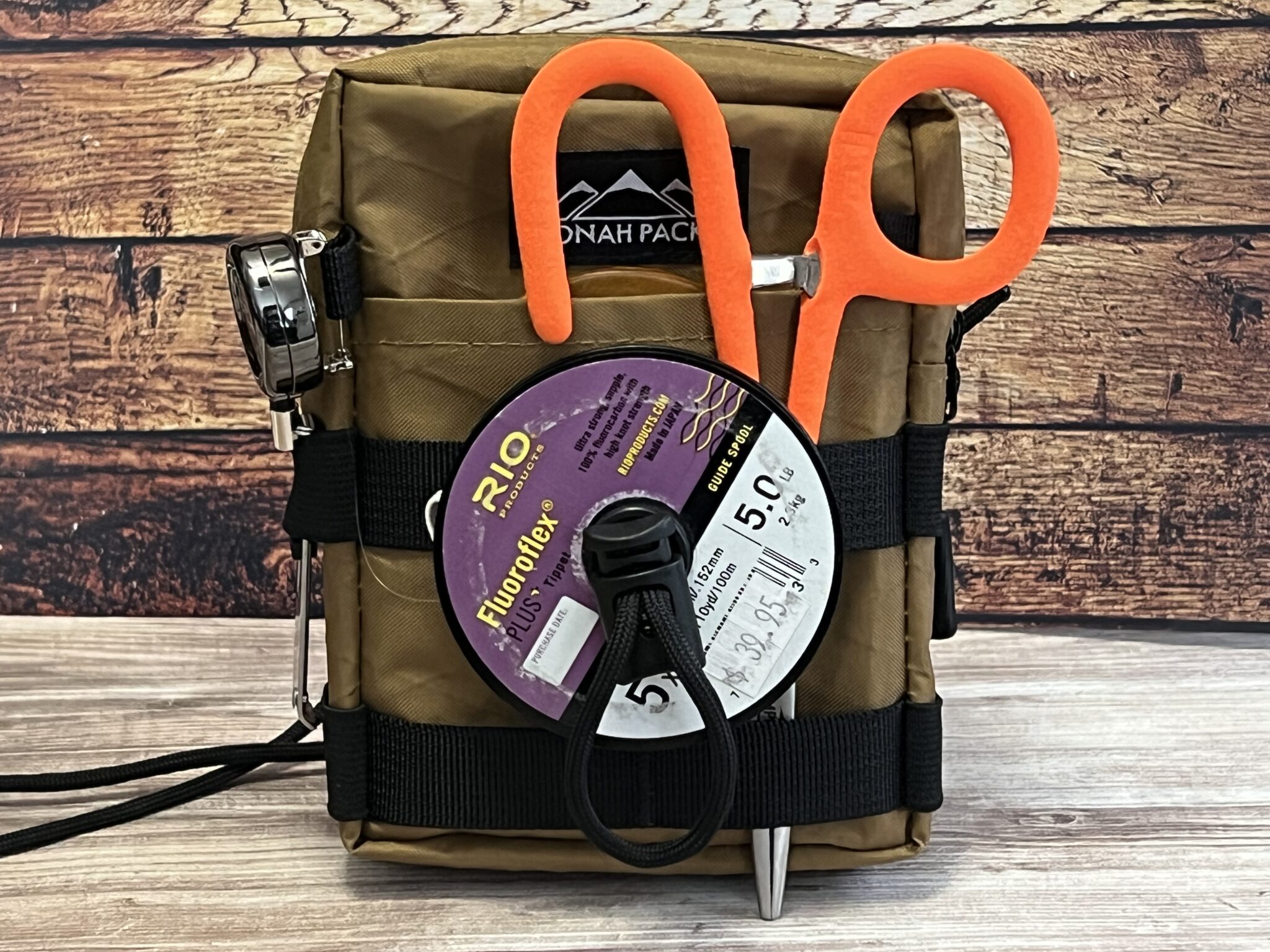
Barbless is better!
To me, barbs are barbaric. They’re relics of the days when people fished for sustenance and before the advent of sportfishing. Given the popularity of catch-and-release, I feel they have no place in modern sportfishing and as I point out above, can actually be an obstacle to landing a prize catch. If you haven’t tried it yet, give barbless fishing a try. If you give it a fair shake, I think you’ll find that barbless really is better.








I have no issue with barbless hooks, and do crimp. I think that you make one terrible generalization. You assume that we are all here for catch and release. You equate fishing for food with barbarism. I will tell you that I do mix the two. I fish for sustenance and in some situations I fish catch and release.
This is a big divide in fishing today. Catch and release fishermen treat those who eat their catch as a problem or something damaging to fish populations. In certain populations it certainly can be damaging. But overall, what is also, and potentially more damage is factory farming, fish farming, or commercial fishing. All of which are options you can rely on less if you fish for food.
If you call it barbaric for some other reason than killing and eating the fish (the actual fishing part) catch and release does all of the same things, but without the final goal of feeding yourself.
Hi Thaddeus,
Sorry if I offended you but most of the people who read my blog are recreational anglers, not fishermen or fisherwomen providing for their families or a market. Either way, I still think barbless hooks work better not only to catch the fish, but also to release or kill them more compassionately.
I was in the process of landing a smallmouth bass one time. as I grabbed the line to steady it (with a nice bend in my rod) the fish shook and threw the hook, which sprang back and buried itself into the side of my ring finger all the way to the bend. I thought to my self “i hope i pinched that barb down.” usually i do as i tie them. The hook backed out easily and hardly left a mark.
Since I started fly fishing in 1999, I always fish barless for reasons #2 & #3. I agree there is no real evidence that fishing with barbs allows for more fish than barbless. My comments are for fishing with flies only.
Hi.
Probably the most painful fishing injury I have seen happened to a friend of mine who was fishing with barbed hooks. Watching it all from the bank it was also one of the funniest incidents (for me at least).
Friend casts out and then puts his rod down to get his drink. A fish bites and drags the rod and reel into the water never to be seen again… or so we thought. A few minutes later the tip of the rod appears above the water about 20 yards away. The reel was holding the butt end under water leaving the tip to appear like something out of Arthurian legend.
Friend and another guy get the rowing boat and paddle out to get the rod back. As they carefully try to get it out of the water they realise the fish is still on so try to handline it in. Unfortunately whilst doing this the fish makes another run for it and the dropper fly sticks in to his thumb and sticks fast due to the barb.
The fish then decides to go under the boat and is fighting hard and every pull is agony for him. By this point they are both leaning right over the side trying to cut the dropper off and almost tipping the boat over. Eventually they cut the dropper line and successfully land a 5 lb rainbow as well as getting the rod and reel back undamaged.
The final result was a visit to the hospital for a tetanus jab and the hook removal.
Steve
Steve,
Ouch! But good story. Too bad you didn’t get it on video.
…Thanks Jason…I completely agree with using barbless hooks… Bravo for an excellent read…
Years ago someone told me that the original reason for the barb was to hold the bait on.
Jim, that’s true, and the barb somehow carried over into sport fishing (catch & release) even when you’re not using bait. It’s not only no longer necessary with modern angling techniques and tackle–in my opinion, it’s cruel & unusual punishment to both fish and fishermen in the 21st century.
Quick questions,
I still fish a rod and bait cast reel, not fly fishing, just fishing, sometimes with a jig, sometimes with a worm, sometimes catch and release, sometimes to eat. So when doing this style fishing can I use barbless hooks? Won’t the worm tend to slide off the hook? Are barbless hooks applicable for any style fishing? If not what styles of fishing can I use barbless hooks (or vice versa if the list is shorter that way)?
Another question not on the subject
I have been wanting to try fly fishing for a while and after reading about Tenkara I ordered a setup. I intend to use it in the Louisiana swamps and lakes to catch sakalay and other types of bream during the off saltwater fishing season. Will this style of fishing do good for murky swamp water where I am always blind fishing? I haven’t tried flies yet, if I don’t catch fish on them, can I rig a worm or weighted jig on the tippet and use the same fishing techniques as I would fly fishing?
Sorry those last questions are off topic, I should join a forum.
Hi Ryan,
The barb will help keep bait on better. There are hooks called “bait holder” hooks that have barbs on the shank (not just the point” to help prevent it from slipping off but of you smashed down the barb on the point, it could still come off.
I think a tenkara rod would work for the swamp. You’ll probably be moving the fly and will feel the strike so it’s not necessary to be able to see the fish or the fly.
As for using bait with a tenkara rod, they’re not really designed for that and I can’t see any practical advantage. Seems like an ultralight spinning outfit would be more suitable.
Hope that helps!
Jason,
I have an ultra-light spinning outfit but when compared to a Tenkara rod it’s a lump of lead. I’ll guess I’ll just have to try some flies in the swamp when the setup gets delivered. I’ll let you know how it works.
Thanks for the Info.
Ryan
P.S. Love the website tons of good info
Hi Ryan,
In my opinion:
Bait is boring. Flies are fun.
Give the flies a try and I think you’ll really like it better. Let is know how you make out.
Jason
I sure will, though I am going to join the forum, look for an update their.
Again thanks for all the info.
Ryan
I use barbless hooks because they’re easier to use, I also sometimes go one step further and fish a hookless fly. If I’m having a bumper day and hooking lots of fish (especially small ones) I’ll reach for a small box of hookless flies I keep with me and enjoy the takes rather than the fights, I’m going to be putting them back anyway so the fight is just a formality.
As for the barbaric argument I would say that all fishing is a little barbaric but it is what it is and I enjoy it so….whatever.
The question about worms is interesting, most coarse fishing hooks in the UK are barbless as most coarse fishing is C&R unlike game fishing here. I wouldn’t be too concerned about worms wriggling off the hook but if you are you can leave a short tag where you ties on your hook and slide the wormup the hookshank and over the knot releasing the tag which will hold the bait in place, you can then hook the worm a second time on the hook.
In the province British Columbia (BC) in Canada, the recreational fishing regulations only allow SINGLE barbless hooks on non-tidal river, with one artificial lure or one artificial fly, no dropper flies. And the regs also say that a foul hooked fish has to be released immediately. We are so used to it, whether you practice catch & release or meat fishers. IMO, barbless hooks is a very good thing.
If you teach fly fishing and fishing merit badge to young Boy Scouts… you’ll be very glad you bend down ALL the barbs on ALL the flys and lures. LOL LOL LOL
Aloha,
Stan
Don’t forget removing hooks from clothes, waders, boots, vests, shoelaces, hat,s nets, etc….
Really helps when the fly is stuck in an awkward place, like my back.
I don’t hook myself very often, but flies get stuck in clothes almost every trip.
Good point Bruce. I didn’t even think about that.
Not as barbaric as when I cut their stomachs open and gut them while they are still alive. 😉 I do like the fact that the barbless don’t cling to everything when they inadvertently get stuck.
I always mash down the hooks that have barbs, but long ago I started using round jawed pliers to debarb my hooks instead of flat jawed pliers. I found that I had tendency to sometime break the hooks while using flat jawed pliers, but with the round jawed pliers, I almost never break a hook. Just a different perspective.
Litubds